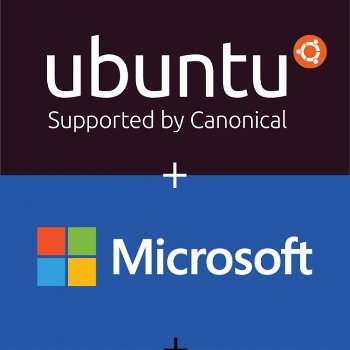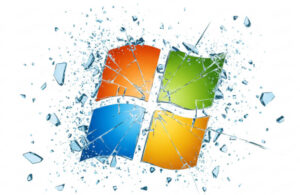There’s little doubt that a few eyebrows were raised by the news on Friday, when Larry Cafiero reported on FOSS Force about Canonical’s partnership with Microsoft involving Microsoft’s OCS hardware and Ubuntu’s open source Metal-as-a-Service (MAAS) deployment product. Those with a little memory might wonder if this is a case of history repeating itself, as we’ve seen Microsoft court aspiring princess distros before, with SUSE, not long after the distro was purchased by Novell, a company with an uneven history.

In 2003, to establish its open source cred, Novell went on a buying spree, which began in August when it spent an undisclosed amount to acquire Ximian, the open source company behind Evolution, Mono and Red Carpet, the later being an early attempt at an universal package manager for Linux, a precursor to Linspire’s Click & Run. In November, just three months later, Novell spent $210 million, partly financed by an investment from IBM, to purchase SUSE (then SuSE), which was at the time one of the top three Linux distros by most estimations.
Although Novell’s move to open source was slowly paying off and generating substantial income, the new revenue stream wasn’t enough to replace income loss from its declining NetWare business. In spite of massive cuts, the company was bleeding. Wolves were circling, with each wanting a piece of the Novell carcass — even Microsoft, as it turned out.
But Microsoft wanted to keep Novell alive.
In November, 2006, three years after acquiring SUSE, Novell received an eleventh hour bail out when it entered into a joint compatibility and patent agreement with Microsoft. In the pact, Microsoft agreed to pay SUSE $348 million up front and $46 million annually for five years, with return payment by Novell being mainly in the form of support subscriptions for SUSE Linux Enterprise Server (SLES).
 This put Microsoft in the business of selling Linux, which they did in part by using their patent portfolio as a sales tool. The agreement between Redmond and Novell stipulated that users of SUSE Linux, but not the users of any other Linux distro, were indemnified against any patent claims Microsoft might make against Linux.
This put Microsoft in the business of selling Linux, which they did in part by using their patent portfolio as a sales tool. The agreement between Redmond and Novell stipulated that users of SUSE Linux, but not the users of any other Linux distro, were indemnified against any patent claims Microsoft might make against Linux.
This was a big win for Microsoft, which realized that compatibly with Linux was now essential for Windows’ survival. SUSE, under rein and financially dependent on Redmond, could be harnessed as a partner that wouldn’t compete with Windows in any way, as continued bail out money came with built-in boundaries that its FOSS partner couldn’t afford to cross. This move almost immediately prompted Red Hat to offer it’s own free indemnity plan, protecting its customers from any Microsoft patent threats.
There was just one problem: Many thought the SUSE/Microsoft patent indemnity deal wasn’t in compliance with the GPL — although SUSE and Microsoft claimed otherwise. There was no doubt by anyone, except maybe Steve Ballmer, that the deal wasn’t in agreement with the spirit of the GPL, even if should turn out to obey the letter of the license.
The FOSS community, already riled up over recent actions by SCO, which had sued IBM for allegedly contributing copyrighted Unix code to Linux, was livid, and it didn’t help that Novell had significant historic ties to SCO, which included Unix. The move was seen as an attack by Microsoft against enterprise users of any Linux distro.
The agreement turned out to be a public relations nightmare for Novell, of course — not so much for Microsoft which was used to it. For several years the SUSE/Microsoft deal dominated tech media reporting, alongside SCO — sometimes in the same story. In the end, Novell redeemed itself, somewhat, by swapping hats from black to white while riding to the rescue, asserting its ownership of Unix, and killing SCO’s copyright case against IBM and Linux in the process.
That last move turned out to be something of a swan song for both companies. “Old Novell,” which it came to be called in the press, effectively died in 2010 when it was bought by Attachmate, which was then purchased last year by mainframe software provider Micro Focus. SCO went bankrupt, with its products now being owned by Xinuos.
Eight years later, however, the ghost of “old Novell” is still breathing, as SUSE and Microsoft still have a close working relationship. In 2011, the Suse/Microsoft interoperability and intellectual property indemnity arrangement was renewed, with Redmond spending another $100 million in SUSE Linux Enterprise certificates. The current agreement expires on January 1, 2016.
So what does the old SUSE/Microsoft deal have to do with Ubuntu and Redmond’s new partnership arrangement? The quick answer: everything and nothing. Or, perhaps more appropriate for this stage of the game: It’s too soon to tell. One thing’s for sure, even if the deal turns out to be benign and never develops into anything as toxic as SUSE/Microsoft has been, this is sure to develop into something of a brouhaha in the FOSS user community. At the very least, this will become a hot topic on the forums.
Already, a commenter to Cafiero’s article has suggested throwing the baby out with the bath by writing, “Canonical in a partnership with Microsoft?!! Bye-bye Ubuntu, including any distro based on Ubuntu!” There will be a lot of that to come from home users, many of whom are already wary of Canonical’s motives for a host of other reasons.
This isn’t likely to bother Shuttleworth & Company much, as it doesn’t make its money from home users — at least, not until the Ubuntu Phone gets traction. What money the company is making comes from the enterprise, and it’s not clear that enterprise customers care whether Canonical cozies up to Microsoft. Most tech companies, or companies that use tech in a big way, are already dealing with Microsoft themselves, by licensing its products if in no other ways.
However, if this deal or future deals between Canonical and Microsoft prove to play fast and loose with the GPL or other open source licenses, all bets are off the table. These days, nearly all enterprise users rely on open source in a big way — its become the norm — making compliance important for a host of reasons.
All we know for sure is that Microsoft now has two Linux lovers. Make that three, if Oracle Linux OS is added to the mix — enough for an orgy. At least Red Hat is being kept in the mix by the inclusion of its clone, CentOS, as a supported operating system in the Ubuntu/Microsoft project. Incidentally, CentOS trademarks were recently transferred to Red Hat, after the Raleigh based company took control of the project early last year.
Curiouser and curiouser! We’ll see…
Christine Hall has been a journalist since 1971. In 2001, she began writing a weekly consumer computer column and started covering Linux and FOSS in 2002 after making the switch to GNU/Linux. Follow her on Twitter: @BrideOfLinux















Hard to believe Canonical and MS will joint forces. All I can say is ‘LOOK OUT CANONICAL’…
DRAMA
Don’t worry, if M$ tries to trash Ubuntu then somebody like Linux Mint, Elementary OS, LXLE, Lubuntu, or Xubuntu will fork it and will continue offering it as open source OS.
Beeing a SUSE user since the 90’s, I had my problems with the SUSE/MS deal as well. But for me that was more on the licensing FUD.
In the end it turns out that a strong openSUSE community was established – not due to, but despite of the deal.
I see as well that SUSE is the first choice Linux to run SAP on – more because of the fact thar Nürnberg (SUSE) and Walldorf (SAP) are neighbors (in the global perspective) than due to the SUSE/MS deal. (SAP is partnering with MS since 1993).
What does the Ubunutu deal mean? No idea yet. Ubuntu is more a company- then a community driven distro. That makes some decisions easier. Lets wait and see….
A bit too early to say where this is going, I really hope the Canonical camp remains wary of what happened to previous redmond “partners”.
Unfortunately microsoft has mastered the art of “damned if you do, damned if you don’t”. Using anything FOSS-related they infect strengthens them, shunning said product or service only weakens the third party stuck in the middle of ms and disgruntled users.
Rather than wasting time acting willy-nilly and pronouncing Ubuntu dead, I’d like to see people help prevent anything that allows ms to do as they please to squash any threat to their hegemony.
That has to come from users, not suppliers.
In my case, that means making sure the younger generations get exposed to FOSS (with e.g. the Raspberry Pi) ASAP so they EXPECT free software while growing up.
Well.. this FUD engine is still alive and well. What Christine is saying is that the whole world should not (ever) use Microsoft software. And well, as an ideological point, I agree. However, my day to day finding is that wherever I do work, I find that I need to integrate with Microsoft. Sure, you can be like some and “just say no”, but then Linux (as a deployed distribution) ceases to be the great integrator that it is well know for being.
I guess at the end of the day is it’s all about *hate*. If I *hate* Microsoft, then I must hate anybody who tries to integrate (e.g. Linux, if Linux is a person) with them.
I think it’s time to just stop posting crapola like this. It’s putrid crap too. I mean, what good did it do? Is it for real? No. It’s mindless nonsense aimed at stirring up people to make them … in the end… *hate* Linux.
I mean, if it really portrayed the details of the relationship in a real manner … maybe it would be “ok” if presented for historical context…. but no, it was the same old lies and misinformation made by people without a clue with regards to the relationship based solely on the logic that we must *hate* anything that touches Microsoft.
FOSS – Fools Offending Stupid SUSE? That must be what it means here…. I prefer the old acronym better.
Corporations generally behave like psychopaths.
In other words, it is foolish to think ANY corporation, including but not limited to Microsoft will do anything in your best interest. They act only in their own best interest.
Thinking of Linux as a product and that it needs market share to be successful (for some arbitrary defintiion of successful) is a fool’s errand.
Well folks its time for me to jump back to debian again.but what about ubuntu based distros Mint. Just like suse deal a large part of the community is going to be lost and other communities will grow. History repeating itself. Mark should buy a shovel and start digging. Some other companies hurt by M$. IBM, Apple, Novell.
If you sell out to Microsoft you are no longer free, you are a property. Ubuntu is the OS to take you away from Windows easily. If Canonical sells new users will be lost and all the spawn distros will have to fold or become independent.
Reading this, it appears the “one problem” was some real or imagined non-compliance with GPL, whether in letter or spirit. Nothing said about anything any particular FOSS developer wanted to do and was prevented from doing by the deal (?) Red Hat seems to have imitated it – same question – what’s the prob?